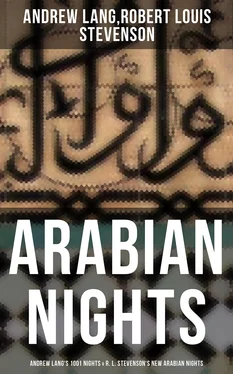Andrew Lang,Robert Louis Stevenson
ARABIAN NIGHTS: Andrew Lang's 1001 Nights & R. L. Stevenson's New Arabian Nights
Published by
 Books
Books
Advanced Digital Solutions & High-Quality eBook Formatting
musaicumbooks@okpublishing.info2017 OK Publishing ISBN 978-80-272-3404-2
Andrew Lang Arabian Nights or One Thousand and One Nights
Robert Louis Stevenson New Arabian Nights
Andrew Lang
Arabian Nights or One Thousand and One Nights
TOC
Preface
The Story of the Merchant and the Genius
The Story of the First Old Man and of the Hind
The Story of the Second Old Man, and of the Two Black Dogs
The Story of the Fisherman
The Story of the Greek King and the Physician Douban
The Story of the Husband and the Parrot
The Story of the Vizir Who Was Punished
The Story of the Young King of the Black Isles
Story of the Three Calenders, Sons of Kings, and of Five Ladies of Bagdad
The Story of the First Calender, Son of a King
The Story of the Second Calendar, Son of a King
The Story of the Envious Man and of Him Who Was Envied
Story of the Third Calendar, Son of a King
The Seven Voyages of Sindbad the Sailor
First Voyage
Second Voyage
Third Voyage
Fourth Voyage
Fifth Voyage
Sixth Voyage
Seventh and Last Voyage
The Little Hunchback
Story of the Barber’s Fifth Brother
The Story of the Barber’s Sixth Brother
The Adventures of Prince Camaralzaman and the Princess Badoura
Noureddin and the Fair Persian
Aladdin and the Wonderful Lamp
The Adventures of Haroun-al-Raschid, Caliph of Bagdad
Story of the Blind Baba-Abdalla
The Story of Sidi-Nouman
Story of Ali Colia, Merchant of Bagdad
The Enchanted Horse
The Story of Two Sisters Who Were Jealous of Their Younger Sister
The stories in the Fairy Books have generally been such as old women in country places tell to their grandchildren. Nobody knows how old they are, or who told them first. The children of Ham, Shem and Japhet may have listened to them in the Ark, on wet days. Hector’s little boy may have heard them in Troy Town, for it is certain that Homer knew them, and that some of them were written down in Egypt about the time of Moses.
People in different countries tell them differently, but they are always the same stories, really, whether among little Zulus, at the Cape, or little Eskimo, near the North Pole. The changes are only in matters of manners and customs; such as wearing clothes or not, meeting lions who talk in the warm countries, or talking bears in the cold countries. There are plenty of kings and queens in the fairy tales, just because long ago there were plenty of kings in the country. A gentleman who would be a squire now was a kind of king in Scotland in very old times, and the same in other places. These old stories, never forgotten, were taken down in writing in different ages, but mostly in this century, in all sorts of languages. These ancient stories are the contents of the Fairy books.
Now “The Arabian Nights,” some of which, but not nearly all, are given in this volume, are only fairy tales of the East. The people of Asia, Arabia, and Persia told them in their own way, not for children, but for grown-up people. There were no novels then, nor any printed books, of course; but there were people whose profession it was to amuse men and women by telling tales. They dressed the fairy stories up, and made the characters good Mahommedans, living in Bagdad or India. The events were often supposed to happen in the reign of the great Caliph, or ruler of the Faithful, Haroun al Raschid, who lived in Bagdad in 786-808 A.D. The vizir who accompanies the Caliph was also a real person of the great family of the Barmecides. He was put to death by the Caliph in a very cruel way, nobody ever knew why. The stories must have been told in their present shape a good long while after the Caliph died, when nobody knew very exactly what had really happened. At last some storyteller thought of writing down the tales, and fixing them into a kind of framework, as if they had all been narrated to a cruel Sultan by his wife. Probably the tales were written down about the time when Edward I. was fighting Robert Bruce. But changes were made in them at different times, and a great deal that is very dull and stupid was put in, and plenty of verses. Neither the verses nor the dull pieces are given in this book.
People in France and England knew almost nothing about “The Arabian Nights” till the reigns of Queen Anne and George I., when they were translated into French by Monsieur Galland. Grown-up people were then very fond of fairy tales, and they thought these Arab stories the best that they had ever read. They were delighted with Ghouls (who lived among the tombs) and Geni, who seemed to be a kind of ogres, and with Princesses who work magic spells, and with Peris, who are Arab fairies. Sindbad had adventures which perhaps came out of the Odyssey of Homer; in fact, all the East had contributed its wonders, and sent them to Europe in one parcel. Young men once made a noise at Monsieur Galland’s windows in the dead of night, and asked him to tell them one of his marvellous tales. Nobody talked of anything but dervishes and vizirs, rocs and peris. The stories were translated from French into all languages, and only Bishop Atterbury complained that the tales were not likely to be true, and had no moral. The bishops was presently banished for being on the side of Prince Charlie’s father, and had leisure to repent of being so solemn.
In this book “The Arabian Nights” are translated from the French version of Monsieur Galland, who dropped out the poetry and a great deal of what the Arabian authors thought funny, though it seems wearisome to us. In this book the stories are shortened here and there, and omissions are made of pieces only suitable for Arabs and old gentlemen. The translations are by the writers of the tales in the Fairy Books, and the pictures are by Mr. Ford.
I can remember reading “The Arabian Nights” when I was six years old, in dirty yellow old volumes of small type with no pictures, and I hope children who read them with Mr. Ford’s pictures will be as happy as I was then in the company of Aladdin and Sindbad the Sailor.
The Story of the Merchant and the Genius
Sire, there was once upon a time a merchant who possessed great wealth, in land and merchandise, as well as in ready money. He was obliged from time to time to take journeys to arrange his affairs. One day, having to go a long way from home, he mounted his horse, taking with him a small wallet in which he had put a few biscuits and dates, because he had to pass through the desert where no food was to be got. He arrived without any mishap, and, having finished his business, set out on his return. On the fourth day of his journey, the heat of the sun being very great, he turned out of his road to rest under some trees. He found at the foot of a large walnut-tree a fountain of clear and running water. He dismounted, fastened his horse to a branch of the tree, and sat by the fountain, after having taken from his wallet some of his dates and biscuits. When he had finished this frugal meal he washed his face and hands in the fountain.
Читать дальше

 Books
Books










